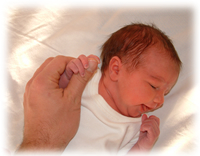
The Right to a Child
It may be useful to have a look at the section on the Right to Life, which covers the issue of rights and how many people disagree about whether it is meaningful to talk of human rights at all.
Clearly it is impossible to talk about the 'right to a child' in the same way as the right to accommodation or food. While many people claim that a civilised society should ensure that every person is clothed, fed and housed, no-one is saying that anyone who is childless should be provided with a child. The 'right to a child' is clearly something else entirely.
The debate about the 'right to a child' is mostly about infertility treatments. Infertility affects at least 5% of couples (figures vary according to country and how you define infertility - a useful definition might be 'an inability to have a child despite trying over a long period of time [or over two years]'). More information is available from the HFEA.
There are a number of treatments available to couples affected by infertility. Many of those treatments cost a significant amount of money. The success rates vary - IVF is successful in around 1 in 4 cycles, although this drops considerably for women in their late thirties and beyond. Donor insemination is around half as successful as IVF, although is much cheaper and simpler to repeat.
People who argue for a 'right to a child' often suggest that infertility treatments should be available to all couples free of charge. However, this seems to confuse the deontological concept of a right with the pragmatic consideration of which resources might be made available to everyone.
It would be less confusing to remove talk of 'rights' and merely consider the issues raised by infertility.

